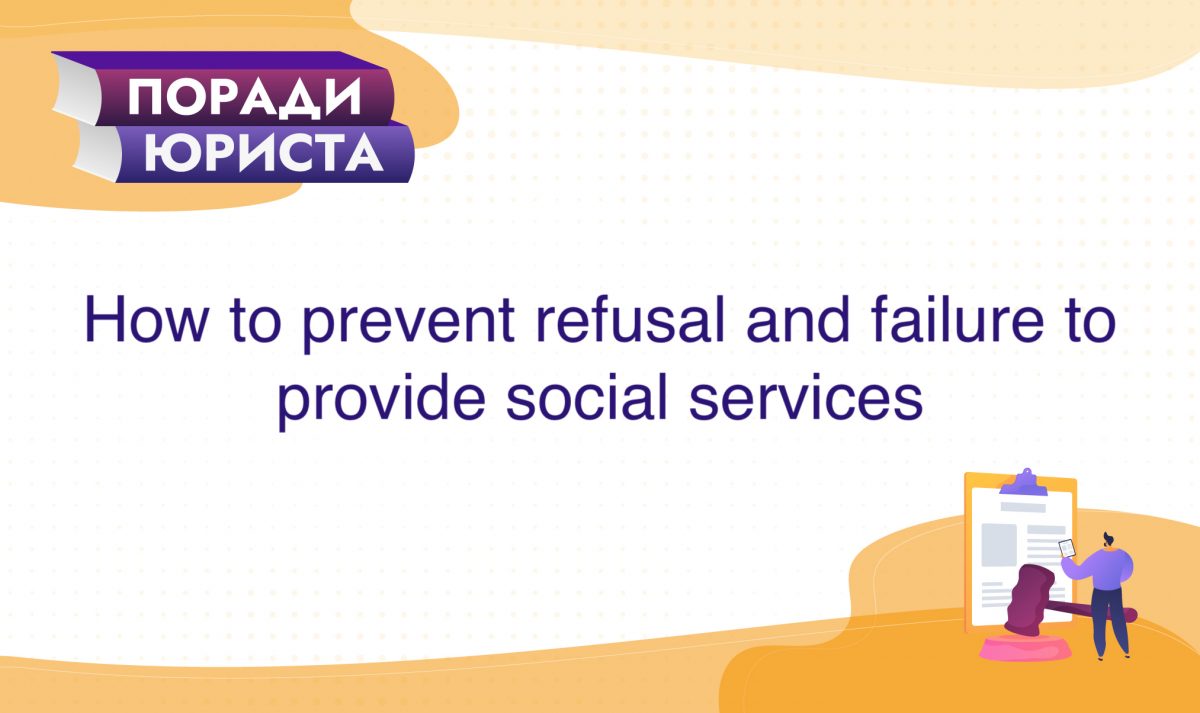On January 01, 2020, the Law of Ukraine “On social services” came to force, envisaging provision of social services:
- Social services are provided free of charge to individuals whose average total monthly income does not exceed two subsistence minimums for the relevant category of individuals (for example, the current subsistence minimum for able-bodies persons 2270 UAH per month).
Also, free of charge:
- regardless of the income, to people – victims of human trafficking who receive social support according to the legislature on preventing human trafficking;
- to people – victims of domestic violence or gender violence;
- to children with disabilities, persons with Group 1 disability;
- to orphan children, children deprived of parental care, individuals of this category under 23 years of age;
- to families of guardians, custodians, foster families, family type children’s home, the families of caregivers, sick children who were not established the disability status.
All other categories of individuals are provided free of charge emergency (crisis) social services, representation of interests, counseling services, etc.
2) at a differential charge (the beneficiary of service covers a share of its cost) – to individuals with average total monthly income exceeding two but not exceeding four subsistence minimums for the relevant category of individuals.
3) at a charge – to individuals with average total monthly income exceeding four subsistence minimums for the relevant category of individuals.
According to the Law, social services are measures aiming at preventing difficult life circumstances, addressing such circumstances, or mitigating their negative consequences for individuals/families being in such circumstances.
Social services are provided:
1. At the place of living (home-based);
2. On the premises of the social service provider:
– stationary – during 24-h stay (accommodation) of the social service recipient, with meals and accommodation provided;
– semi-stationary – during a certain time of the day, with facilities for overnight or daytime stay;
3. At the location of the social service recipient, including in the street.
Typical forms of providing social services
Home-based social assistance is the provision of social services at home.
A social worker provides various kinds of social services, including:
- meal preparation (assistance in meal preparation) at home, feeding;
- purchase and delivery of goods from a shop or a marketplace, delivery of books, magazines, newspapers, medications at the cost of the individuals receiving the social services;
- calling a doctor, assistance in periodic medical checkups and hospitalization, visiting patients in health facilities, arrangement of consultations by specialist physicians and other specialists;
- assistance in home cleaning, laundry, personal hygiene, mending of shoes and clothes, fuel supply;
- preparation of documents to receive subsidies for utilities and communal services, other types of social services, making payments;
- reading the press;
- preparation of documents required for treatment in a health resort, accommodation to a residential center, geriatric residential center, a boarding house for military and labor veterans, a nursing home for mental patients, a veteran residential center, other social facilities;
- support in provision of the necessary technical and other rehabilitation means;
- other social services.
Provision of targeted in-kind and financial aid is a service delivered to individuals who, based on the living conditions assessment report, need in-kind or financial assistance. Based on the capacities, available finance, and resources, the department provides to such individuals free of charge:
– clothes, shoes, other essential needs (if available);
– drugs and medical supplies (if available);
– household hygiene items (if available);
– food and commodities;
– services of a seamstress and a hairdresser.
Provision of social adaptation services includes services provided to individuals with partial mobility impairment, individuals partially incapable to take care of themselves who do not have medical contraindications for staying around other people and need social adaptation, in order to address the disability, prevent occurrence and development of possible illnesses, maintain health and social independence of the individual, renew knowledge and route-finding skills at home, household and self-care skills, interpersonal skills, foster development of various interests and needs of the individual, arrange rest and recreation activities.
Sociomedical services aim at facilitating recovery and improvement of the health status, vital functions of individuals, identifying and using other opportunities, ensuring conditions for returning to normal activities, prevention of complications and relapses of the disease. This category of social services includes continuous supervision and control of the physical and somatic status of the served individuals, provision of counseling and support on health and legal issues.
To receive social services, a person in need of them or the legal representative of such a person must contact the social protection department at the place of residence/stay.


